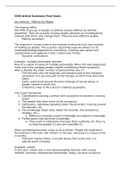CIDS Article Summary Final Exam
Ian Hacking – Making Up People
The looping effect
We think of groups of people as definite classes defined by definite
properties. They are actually moving targets because our investigations
interact with them, and change them. They become different people.
- Making up people.
The engines in human science are engines of discovery but also engines
of making up people. This is partly caused because we always try to
medicalize/biologize/geneticize everything. Creating new names and
assessments and apparent truths creates new ‘things’.
- Dynamic nominalism.
Example: multiple personality disorder
Rise of a couple of cases of multiple personality. When this was diagnosed,
more and more unhappy people started manifesting these symptoms.
After a decade the mean number of personalities was 17.
- This fed back into the diagnosis and became part of the standard
symptoms it became part of the therapy to elicit more and more
alters.
- Easily understood pseudo-Freudian etiology of sexual abuse
people started to recall this.
- It became a way to be a person (making up people).
The 5 part framework
1. Classification causing a person with symptoms to become a moving
target.
2. The people that have some of the symptoms.
3. Institutions, talkshows speaking about the disorders, training around
the disorder, etc.
4. The knowledge (basic facts about the disorder, like prevalence,
etiology, etc.).
a. Difference between expert knowledge and popular knowledge.
5. Professionals that generate knowledge.
a. They work in institutions that give them authority (3), they try
to help the people (2) who are classified (1).
When something becomes a way to be a person. People will experience
themselves in this way, will interact in this way, because it is a way to live
in society.
- Transient mental illness: a mental illness that exists only in a
specific point in history.
Example: autism
In the past, autism was a rare developmental disorder with a quite
definite, narrowly characterized stereotype. Today, we have an autism
, spectrum. Ever since this, there has been an increase of people with
autism and there are high functioning autistic people.
- It has become a way to be a person, to experience oneself, to live in
society.
How does making people up take place?
Discovery: count, quantify, create norms, correlate, medicalize, biologize,
geneticize.
- Count: An increase in prevalence can be caused by either an
increase of people with the disorder, or changes in criteria and
alertness for diagnoses.
- Quantity: It is hard to quantify deficits in disorders.
- Norms: it is unclear which comes first: normalcy or deviance
there will always be deviances in people.
- Correlation: we try to correlate disorders with everything. Not
everything needs to have a statistical theory or analysis.
- Clinical medicine: relentless medicalization of disorders. If you frame
disorders more as disabilities (especially autism) it will be less
medicalized.
- Biology: biologizing a disorder relieves the person of responsibility.
Practice: normalize
- Normalizing: we try to make unfavorable deviants as close to normal
as possible, though treatment of medication.
Administration: bureaucratize
- Bureaucracy: there is a positive side to bureaucracy, as it can help
identify and support children with disorders.
Resistance: reclaim our identity
- Resistance: the people with the disorder try to take back control.
What is a real kind?
- Is it a child with autism or an autistic child?
o Autism defines who the person is, so you could look at autism
as a real kind.
o Autism is exclusive to humans, so something autistic is always
a human. Therefore it can be seen as a real kind.
o People with autism share many characteristics.
- Is it fat people or people with obesity?
o Fat can refer to other things than people.
o Being fat does not define the person, because there are other
aspects that underly the person.
o Fat people don’t share other characteristics, other than being
fat.
Example: genius
- Genius has been tried to be made measurable, but by doing this, it
has disappeared.
- A true genius will refuse to be measured, because they understand
that classification will take it away.




